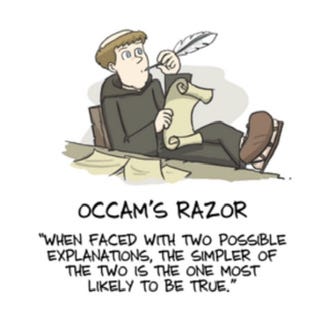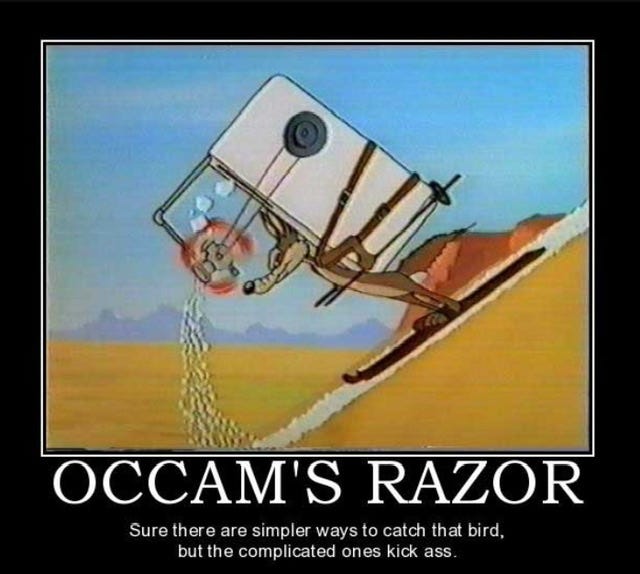Occam’s Razor: The Simplest Explanation Is Usually the Best One
Dad’s Car Repair Rule: Start With the Least Expensive Part and Hope It’s the Best One
This week I ran across a list of “razors” and rules that the author suggested people follow to make their decision-making more streamlined. Not sure I agreed that all of them were helpful, but in my experience, the first one is not a bad place to start:
Occam’s Razor: the simplest explanation is usually the best one
Given that the “modern” version of the rule has purportedly been around for about 700 years, there are a number of different phrasings for it. William of Okham, a 14th century English professor and theologian, is given credit for the original “modern” version of the concept though not the “formal” phrasing: “Entities must not be multiplied beyond necessity.” (Originally in Latin, of course: “Entia non sunt multiplicanda praeter necessitatem”). Per Wikipedia, it is also known as the principle (or law) of parsimony, and there were many older versions.
There can be a lot of dense and philosophical applications of Occam’s Razor, but most of us don’t need the complex version, just the simple one. (See what I did there? 😉). For everyday use, the phrasing I have above is the most help: the simplest explanation is usually the best one. As a problem-solving “rule” it can be either forward or backward looking. For me, I consciously most often use it looking backwards: if there are an array of possible explanations for why something happened, it is more likely to have been the simplest explanation rather than a more complex explanation.
For example, if you ran out of gas, the more likely explanation is that you forgot to fill the car up rather than that the international band of gas thieves crept into your garage and syphoned it off. If your house plant died, it’s more likely that you forgot to water it rather than someone poisoned it. Those are silly examples, but you get the idea.
But Occam’s Razor can also be forward looking. Let’s say you have a problem to solve and an array of options to solve it, from simple to complex. Assuming all are equally good at solving your problem the best option is the simplest. Now of course, not every option will be equally good at solving your problem, so you may have to pick the second or third simplest option, but again the idea is that it is generally better to use the simplest option you can to solve your problem. For one thing, it is easier to implement, but also it is less likely to have unexpected or unwanted side effects.
My dad the engineer had a car repair rule that is similar to Occam’s Razor: Start with the least expensive part and hope that fixes it. That is, if your car is not working and the problem could be caused by an array of different things ranging from low cost to expensive, start with the least expensive one and hope that fixes the problem. Maybe the car needs new spark plugs or maybe it needs a new starter or maybe it needs an entirely new electrical system1 — start with the spark plugs. If that doesn’t work, move on to the next cheapest part and replace that. There is also the “easiest to do” corollary— if it could be one of two things, both low cost, do the one that’s easiest to do first and hope that fixes it. (There are a lot of auto repair shops that could get a lot of loyal customers if they would follow my dad’s car repair rule ….).
These days it’s hard to repair your own car because of all the computerized components, but that rule can work for lots of things in real life. Some things we just do without thinking about it, like replacing a light bulb before buying a new lamp. Some require a little thinking, such as if the sliding glass door isn’t sliding so well anymore, maybe using some graphite or WD40 (hello again, dad!) will work and you don’t need to replace the whole thing. As the problems become bigger they require more thinking and choosing between options, but often the best option is the simplest and/or cheapest one.
Occam’s Razor may seem pretty obvious, but I think it could use more use these days, both when figuring out what might have happened or in solving a problem going forward. And my dad’s car repair rule is always a good one to keep in mind! 😉
Have a wonderful weekend, and Happy Father’s Day!
Audra
Ecclesiastes 4:6 Better one handful with relaxation, than two handfuls with hard work and chasing the wind.
Okay, folks, I’m not an engineer and I don’t know cars, so if this example doesn’t make sense, sorry, but just stay with me here, you get the point.




Are you sure? I think it is likely that the fault lies with the international band of gas thieves! ;-)